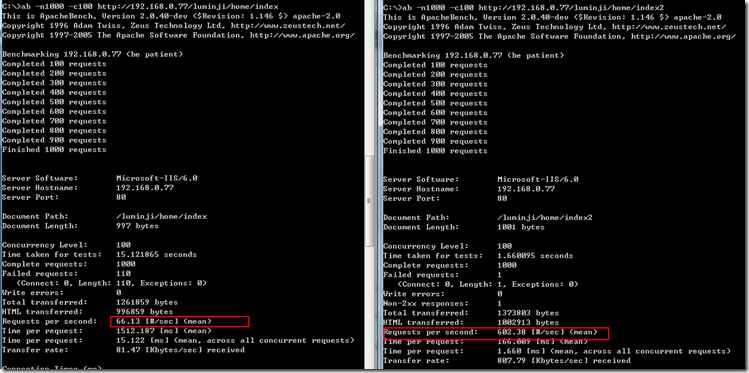您好,登录后才能下订单哦!
本篇内容介绍了“ASP.NET中怎么构建自定义文件缓存”的有关知识,在实际案例的操作过程中,不少人都会遇到这样的困境,接下来就让小编带领大家学习一下如何处理这些情况吧!希望大家仔细阅读,能够学有所成!
ASP.NET的输出缓存(即静态HTML)在.NET4.0前一直是基于内存的。这意味着如果我们的站点含有大量的缓存,则很容易消耗掉本机内存。现在,借助于.NET4.0中的OutputCacheProvider,我们可以有多种选择创建自己的缓存。如,我们可以把HTML输出缓存存储到memcached分布式集群服务器,或者MongoDB中。当然,我们也可以把缓存作为文件存储到硬盘上,考虑到可扩展性,这是一种最廉价的做法。
1:OutputCacheProvider
OutputCacheProvider是一个抽象基类,我们需要override其中的四个方法,它们分别是:
Add 方法,将指定项插入输出缓存中。
Get 方法,返回对输出缓存中指定项的引用。
Remove 方法,从输出缓存中移除指定项。
Set 方法,将指定项插入输出缓存中,如果该项已缓存,则覆盖该项。
2:创建自己的文件缓存处理类
该类型为FileCacheProvider,代码如下:
public class FileCacheProvider : OutputCacheProvider { private static readonly ILog log = LogManager.GetLogger(System.Reflection.MethodBase.GetCurrentMethod().DeclaringType); public override void Initialize(string name, NameValueCollection attributes) { base.Initialize(name, attributes); CachePath = HttpContext.Current.Server.MapPath(attributes["cachePath"]); } public override object Add(string key, object entry, DateTime utcExpiry) { Object obj = Get(key); if (obj != null) //这一步很重要 { return obj; } Set(key,entry,utcExpiry); return entry; } public override object Get(string key) { string path = ConvertKeyToPath(key); if (!File.Exists(path)) { return null; } CacheItem item = null; using (FileStream file = File.OpenRead(path)) { var formatter = new BinaryFormatter(); item = (CacheItem)formatter.Deserialize(file); } if (item.ExpiryDate <= DateTime.Now.ToUniversalTime()) { log.Info(item.ExpiryDate + "*" + key); Remove(key); return null; } return item.Item; } public override void Set(string key, object entry, DateTime utcExpiry) { CacheItem item = new CacheItem(entry, utcExpiry); string path = ConvertKeyToPath(key); using (FileStream file = File.OpenWrite(path)) { BinaryFormatter formatter = new BinaryFormatter(); formatter.Serialize(file, item); } } public override void Remove(string key) { string path = ConvertKeyToPath(key); if (File.Exists(path)) File.Delete(path); } public string CachePath { get; set; } private string ConvertKeyToPath(string key) { string file = key.Replace('/', '-'); file += ".txt"; return Path.Combine(CachePath, file); } } [Serializable] public class CacheItem { public DateTime ExpiryDate; public object Item; public CacheItem(object entry, DateTime utcExpiry) { Item = entry; ExpiryDate = utcExpiry; } }有两个地方需要特别说明:
在Add方法中,有一个条件判断,必须做出这样的处理,否则缓存机制将会缓存***次的结果,过了有效期后缓存讲失效并不再重建;
在示例程序中,我们简单的将缓存放到了Cache目录下,在实际的项目实践中,考虑到缓存的页面将是成千上万的,所以我们必须要做目录分级,否则寻找并读取缓存文件将会成为效率瓶颈,这会耗尽CPU。
3:配置文件
我们需要在Web.config中配置缓存处理程序是自定义的FileCacheProvider,即在 <system.web>下添加节点:
<caching> <outputCache defaultProvider="FileCache"> <providers> <add name="FileCache" type="MvcApplication2.Common.FileCacheProvider" cachePath="~/Cache" /> </providers> </outputCache> </caching>
4:缓存的使用
我们假设在MVC的控制中使用(如果要在ASP.NET页面中使用,则在页面中包含<%@OutputCache VaryByParam="none" Duration="10" %>),可以看到,Index是未进行输出缓存的,而Index2进行了输出缓存,缓存时间为10秒。
public class HomeController : Controller { private static readonly ILog log = LogManager.GetLogger(System.Reflection.MethodBase.GetCurrentMethod().DeclaringType); static string s_conn = "Data Source=192.168.0.77;Initial Catalog=luminjidb;User Id=sa;Password=sa;"; public ActionResult Index() { using (DataSet ds = Common.SqlHelper.ExecuteDataset(s_conn, CommandType.Text, "select top 1* from NameTb a, DepTb b where a.DepID = b.ID ORDER BY NEWID()")) { ViewBag.Message = ds.Tables[0].Rows[0]["name"].ToString(); } return View(); } [OutputCache(Duration = 10, VaryByParam = "none")] public ActionResult Index2() { using (DataSet ds = Common.SqlHelper.ExecuteDataset(s_conn, CommandType.Text, "select top 1* from NameTb a, DepTb b where a.DepID = b.ID ORDER BY NEWID()")) { ViewBag.Message = ds.Tables[0].Rows[0]["name"].ToString(); } return View(); } }5:查看下效果
上面的代码,在访问了Index2后,将会在Cache文件夹下产生缓存文件,如下:
现在,我们开始评价下有输出缓存和无输出缓存的性能对比,模拟100个用户并发1000次请求如下:

可以看到,有输出缓存后,吞吐率明显提高了10倍。
6:代码下载
FileCacheProvider的原始代码来自于网络,我修改了其中的BUG,全部代码下载如下:MvcApplication20110907.rar
“ASP.NET中怎么构建自定义文件缓存”的内容就介绍到这里了,感谢大家的阅读。如果想了解更多行业相关的知识可以关注亿速云网站,小编将为大家输出更多高质量的实用文章!
免责声明:本站发布的内容(图片、视频和文字)以原创、转载和分享为主,文章观点不代表本网站立场,如果涉及侵权请联系站长邮箱:is@yisu.com进行举报,并提供相关证据,一经查实,将立刻删除涉嫌侵权内容。